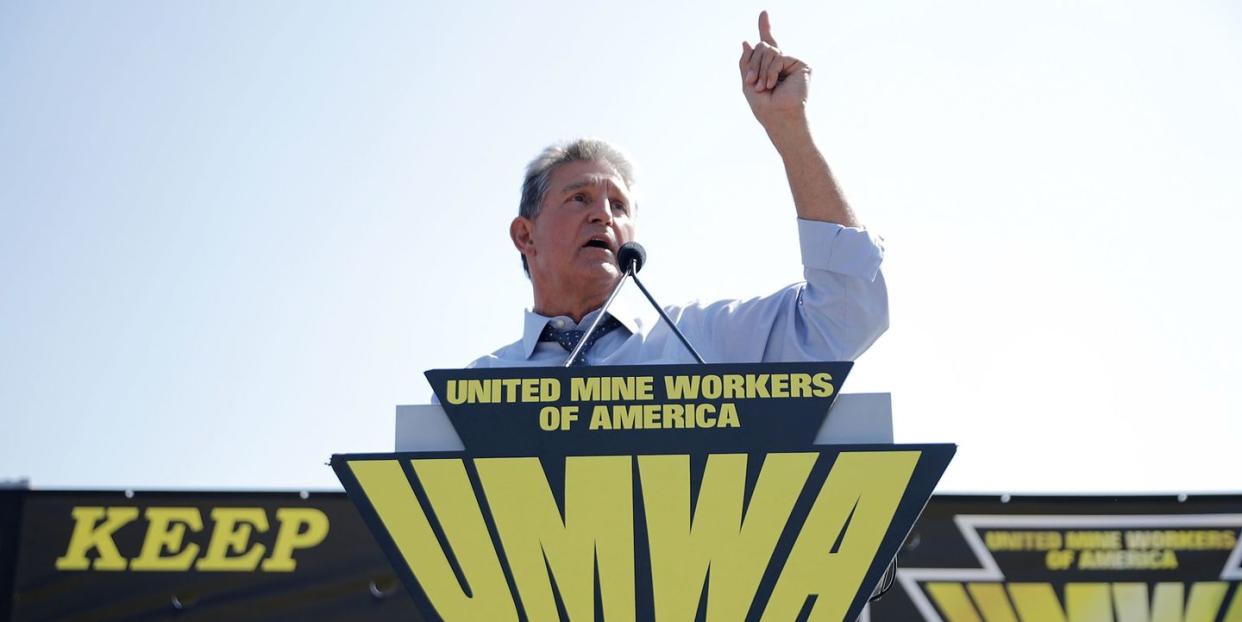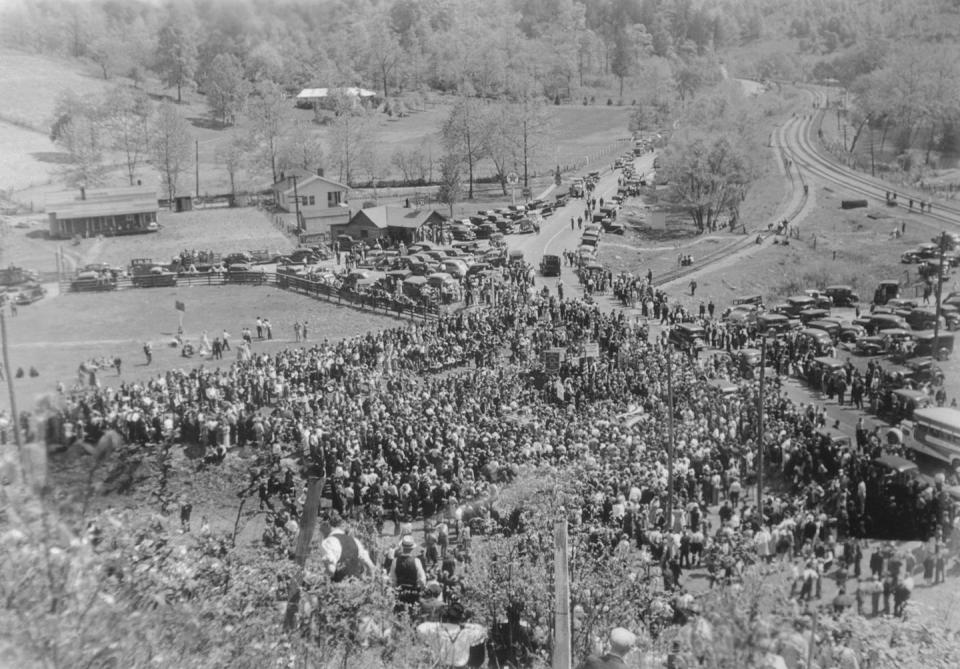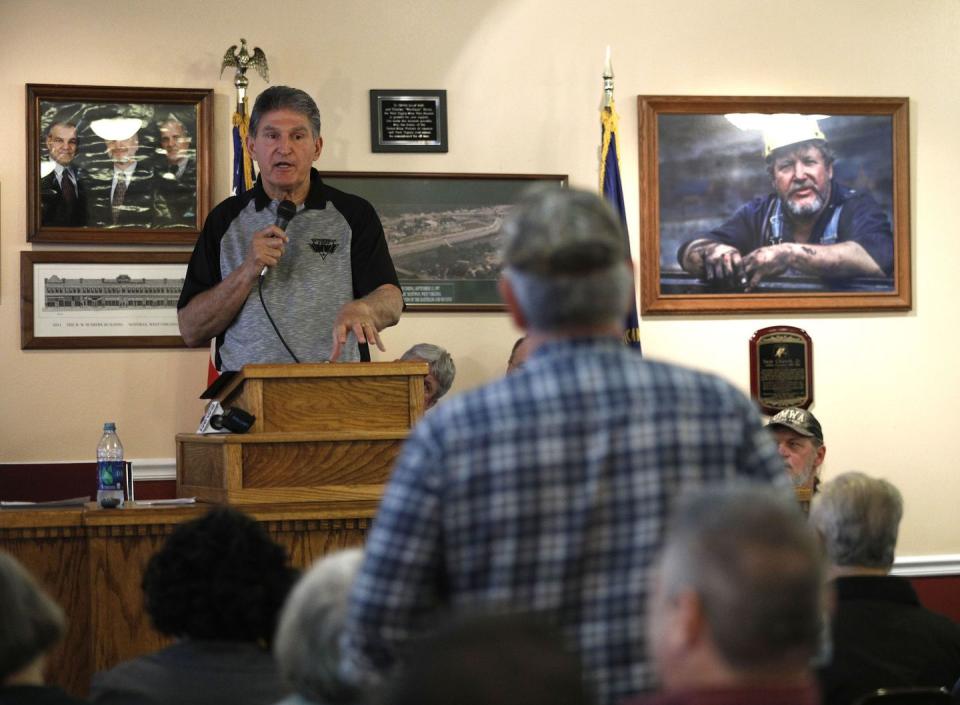The United Mine Workers of America Backs the For the People Act. Will Joe Manchin?

- Oops!Something went wrong.Please try again later.
Joe Manchin left a meeting with American civil-rights leaders Tuesday saying their discussion on the ongoing assault on voting rights—and thus, American democracy itself—at the state level, and the obligation of Congress to respond, was "constructive" and "informative." But he was still against H.R. 1, the For the People Act, the bill those activists had come to lobby him on. In an op-ed last weekend, the senator said he opposes it on the basis that it's 800 pages(?) and lacks support from Senate Republicans. "I don't think anybody changed positions on that. We're just learning where everybody's coming from," he told reporters, and it can't have come as much of a surprise. Manchin going back to West Virginia to tell folks there he flipped on a major elections bill because of a conversation with Al Sharpton just does not seem, whatever the moral merits, like the kind of politics the senator practices.
But it's not only civil-rights leaders who are interested in the passage of S.1, the Senate companion to H.R. 1, a sweeping piece of legislation that tackles voting rights, gerrymandering, dark money in elections, lobbying, and the Washington influence economy. It also has strong support from some of the nation's largest labor unions, like the AFL-CIO. One of its member unions that might have some particular significance to Manchin is the United Mine Workers of America. On Monday, the day after Manchin hit the Sunday Shows to continue to lay out his case, such as it is, the UMWA issued a statement reiterating the union's support for the bill.
“State Legislatures all over the country are revising election laws to restrict access to voting, especially among minorities, workers and senior citizens,” UMWA International President Cecil E. Roberts said. ... “Further, the states that are passing these laws are making it possible for state legislatures to overturn election results they do not like, even if local elections boards have certified them,” Roberts said. “These states are putting a highly partisan stamp on this issue and showing no interest in bipartisanship.”
Roberts noted that while the union also supports the John Lewis Voting Rights Act, passage of that legislation by itself will not address many of the ballot access issues that are becoming law in an increasing number of states.
“It is wrong for these states to attack the basic rights of citizens to participate in our democracy,” Roberts said. “Congress should be doing everything possible to not just maintain, but expand voting access and create freer and fairer elections. If only one party is interested in doing that, then so be it.”
It's hard to see the statement as anything but a rejoinder to Manchin, whom Phil Smith, Director of Communications and Governmental Affairs for the United Mine Workers, describes as "a very good friend" to the union, founded in 1890 with a history that serves as a window into the long—and at times bloody—story of the American labor struggle. We caught up with Smith by phone on Tuesday, while he was down in Alabama participating in a UMWA strike against a local coal company. He said the union's membership is now about 50 percent coal workers amid the industry's wider decline. "We've organized a lot of other folks, healthcare workers, public employees, manufacturing workers, who don't work in the coal industry," Smith added. "Most of them, I will say though, live in areas where the coal industry used to be pretty strong. So we're organizing the sons and grandsons and daughters and granddaughters of coal miners."

The UMWA has helped organize workers in "17 or 18" states, Smith says, including Utah, Colorado, New Mexico. They've got county corrections officers in Pennsylvania, and workers at the Remington arms manufacturing facility in Upstate New York. "We represent all of the blue collar employees on the Navajo Nation," he added. But of course, the home base is still Appalachia, coal country, and Joe Manchin's West Virginia. "We are very good friends with Senator Manchin," Smith said. "We're going to continue to be good friends with him. He's done a lot for our members, both active and retired, over the years. But sometimes good friends disagree, and I think that's where we find ourselves here."
Because in many cases it's those original miners—often now retired, but still full members paying dues—whose interests the UMWA has in mind when voicing its support for the For the People Act. Smith said many retired members have moved south to states like Florida, Arizona, or Georgia, exactly the kind of places that are now cracking down on vote-by-mail after the high turnout of the 2020 election. "Our concern is that making it more difficult for elderly people to vote—vote by mail is a great thing for them," he said. In Smith's view—and there's no evidence to the contrary—the 2020 contest proved that mail ballots are safe and secure. "It's convenient for them, and there's no reason to restrict it."
For unlimited access to Esquire's political coverage, including an exclusive weekly newsletter from Charles P. Pierce, you can join Esquire Select here.
While Senator Manchin seems to be confused about how partisanship is operating here, the union—which Smith contends is among the most consistently bipartisan in terms of which candidates the organization and its individual members support—is not. "The fact of the matter is that it is one party that is driving the measures to restrict voting in this country. And it is the other party that is trying to do something about that," Smith said. Vote-by-mail "was repeatedly certified by Republican Secretaries of State, all over the country," he added. "The Republican members of Congress who got elected via vote-by-mail weren't complaining about that. They're only complaining about one election here, one office. They're not complaining that those votes, those ballots, were somehow messed up for the United States senator, or United States Congress, right? So how does that work? Tell me how that works? If every other checkmark on that same paper ballot that was mailed in, is right, then why is the one wrong?"

The answer, quite clearly, is the outcome. The Republican candidate did not win the presidency, which was the problem Republicans had with the election. This is driven home by the UMWA's other big elections concern of the moment: the current push in some Republican-controlled state legislatures to make it easier to overturn future results, which union president Cecil Roberts name-checked in that Monday statement. When I asked Smith about the union's support for the For the People Act's anti-corruption provisions, he said they were just concentrating on voting and elections. "For us, I think it's just the basic concept of how we run elections in America, and whether people's votes are actually going to count, or can be overturned just because of the political opposition to a winning candidate, which is crazy. They do that in other countries that don't have a free democracy. Why are we even thinking about doing that here?"
Manchin is still holding out for a bipartisan voting-rights bill in the Senate, even after Republican leader Mitch McConnell came out against the John Lewis Voting Rights Act. (Quite a thing to say into a microphone.) Manchin had motioned towards that bill as an alternative to the For the People Act, even if, as the UMWA maintains, the VRA proposal does not meet the needs of the moment, and 10 Republican votes were always vanishingly unlikely to appear. Now, just this week, Republicans blocked even having a debate over the Paycheck Fairness Act that Manchin co-sponsored. This, after they blocked a bill to establish a bipartisan commission on January 6, a violent assault on their own place of work. Yet Manchin still seems to believe there is a bill out there Republicans will cooperate on that will meet the needs of the moment.
Smith said they've been in touch with the senator's office about the For the People Act, just like they are three or four times a week on all manner of issues. The UMWA has not taken a position on reforming or eliminating the filibuster, and Smith expressed some alarm at what a Republican Senate might do, including right-to-work legislation or other bills aimed at further crippling America's unions, with a simple majority But if the right to vote is going to be protected at the federal level at a time when the Republican leader in the Senate has announced his complete commitment to blocking any and every piece of the Democratic president's agenda, it will involve reforming the filibuster.
"Sometimes," Smith said, "you've got to pick sides. Joe is who he is, and if he thinks he can get something reasonably done on a bipartisan basis, that's fine, he should try and do that. But time is running short here."
You Might Also Like

